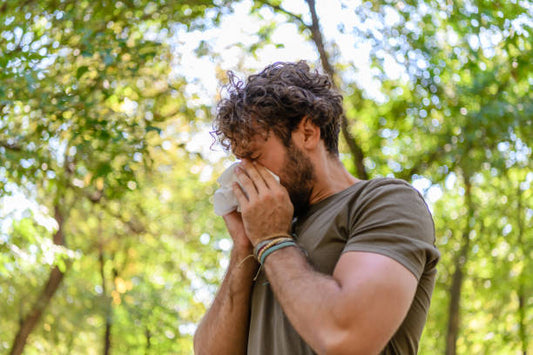What is Collagen?
Collagen is a structural protein that forms the connective tissues and makes up a third of the protein in your body. It is mostly found in fibrous tissues like the tendons, skin, and ligaments. It's in the corneas, cartilage, bones, blood, vessels, intervertebral discs, and muscle tissues. The word collagen comes from the Greek word kólla which means “glue,” a likely meaning for how it functions in the body. Mammals are abundant in collagen, which has molecules that are usually packed together to form elongated fibrils.
The Role of Collagen in the Body
Collagen provides structural support and strength to the skin. It provides elasticity to the the skin and connective tissues mostly when combined with elastin. It strengthens the nails and teeth and helping reduce stretch marks and cellulite. It can support hair growth as well. In the dermis, which is the middle layer of the skin, collagen helps promote cell regeneration. It can also function as a protective covering for certain delicate organs like the kidney. It basically keeps the body together.
What happens when collagen production declines?
Similar to other body fluids and hormones, collagen production naturally declines as we age. This reduces the structural elasticity of the skin leading to fine lines, wrinkles, and sagging skin. Without collagen, the cartilage in joints also starts to weaken. Some women lost collagen early on. However, a majority of women experience a dramatic reduction in collagen synthesis at age 40 to 50 during menopause. From there, the decline continues dramatically.
Causes of Collagen Depletion
There are several factors that can cause collagen levels to deplete. High sugar consumption can make collagen brittle, dry, and weak. Smoking is also one of the major causes of collagen damage and depletion. Tobacco contains nicotine that narrows the blood vessels of the skin which reduces the delivery and absorption of oxygen and nutrients to the skin, thus, affecting its overall elasticity and appearance. Frequent exposure to sunlight also causes damages to collagen. Collagen naturally depletes over time but the factors and detrimental activities aforesaid can speed up this process. But there are also other precautionary measures to slow down the reduction of collagen levels in the body.
Medical and Cosmetic Uses of Collagen
Collagen has been cosmetically to remove lines and wrinkles from the face. Collagen fillers, applied through injection, enhance facial features and may be used as a treatment for certain skin problems. However, this application can be restricted to some people with allergy. Collagen is also used in wound dressing as it attracts new skin cells to promote healing. Such wounds that collagen may heal are chronic non-healing wounds, exuding wounds, granulating necrotic wounds, skin grafts, burns, and full-thickness wounds. Collagen is also used for tissue regeneration in periodontal and implant therapy to promote cell growth.
Collagen Supplementation
Collagen supplements, drinks, and formulation may prove beneficial to people suffering from osteoarthritis, dandruff, and skin conditions. The element may significantly improve the appearance of the skin. Certain hormonal imbalances may cause collagen to decline early on. Nowadays, collagen is popularly known among women to improve their skin through collagen-rich beverages. A study in 2006 also found that collagen hydrolysate significantly decreased painful symptoms of osteoarthritis and can also improve joint function.
Several products in the market claim to have collagen in their creams and serums. However, collagen molecules are too big to be absorbed through the skin. It is easier and non-invasive to take it in as a mild supplement to ensure absorption.
How to Increase Collagen
Collagen is made up of amino acids. Most of these amino acids that comprise collagen are essential amino acids, which means they cannot be synthesized by the body and must be taken in through food consumption or supplementation. There are certain food sources that help supplement collagen production, albeit not in a dramatic amount. Such foods that naturally help promote collagen production are egg whites, meat, cheese, cabbage, strawberries, broccoli, soy, nuts, oranges, and foods rich in Vitamin A and Vitamin C.
Collagen is vital in our body’s processes and in keeping us healthy. It is also a good way to help slow down the manifestation of aging internally and externally. You can try natural methods to increase collagen in your body, supplementation, and even invasive methods. Collagen is not something that we take in for the luxury of reversing age – that only comes as a bonus. Its main purpose is to bind the connective tissues together, retain cellular elasticity, and the result of a healthier you follows.
Recommended Products
References:
McIntosh, J. and Webberley, D. (2015). What is collagen? What does collagen do?. [online] Medical News Today. Available at: http://www.medicalnewstoday.com/articles/262881.php [Accessed 18 May 2016].
Wikipedia. (2016). Collagen. [online] Available at: https://en.wikipedia.org/wiki/Collagen [Accessed 18 May 2016].
Dr. Axe. (2015). What is Collagen? 7 Ways Collagen Can Boost Your Health - Dr. Axe. [online] Available at: http://draxe.com/what-is-collagen/ [Accessed 18 May 2016].




